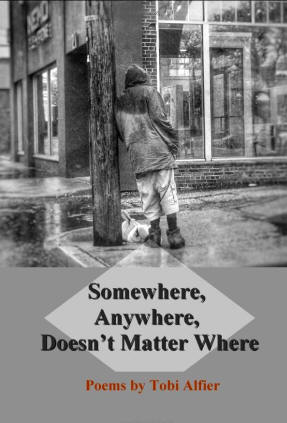
~ Delta Poetry Review ~
Tobi Alfier Two-book Review by Susan Swartwout
Somewhere, Anywhere, Doesn’t Matter Where
(American Fork, UT: Kelsay Books, 2018)

Tobi Alfier’s
Sanity Among the Wildflowers
is a chapbook, lovingly reprinted by La
Cholla Needles Arts and Literary Library, consisting of 27 pages of
poetry and an addendum from the author. In this backmatter essay,
Alfier tells the origin story of her chapbook and offers
encouragement and tips to those aspiring poets who are also on the
journey of compiling their first chapbooks.
Sanity Among the Wildflowers
navigates the treacheries and joys of life and love with the
positive outlook of observers who seem to value every moment of it.
The enthusiasm and the precision of description are infectious, in
the best possible way. This isn’t a Pollyanna point of view, but
rather an undaunted realist who has made peace with life’s
ephemeralities. In the poem “Morning Sounds,” new lovers, old
lovers, and possible lovers all consider different wonders of the
particular sounds, sights, and smells engendered when “there are no
opinions, / all of us are optimists / in the morning.” In “Saturday
Afternoon,” two strangers, each with their own pain, are inspired
and made to feel desirable by the simple fact of a
greeting-in-passing to one another. And, in “5:00 pm Flight,” the
speaker examines her worth in light of seeing her husband’s ring
left by the coffeepot again, “sometimes / to hurt.” She doesn’t
dissolve; she considers, then tends gently to herself and, in a
particularly well-selected set of linebreaks, “carries on in spite
of / his spite, / and creates herself / a lovely day.”
“Lapses and Absences” is one of the most beautiful end-poems I’ve
ever read in a collection. The speaker is alone with a grief she
can’t acknowledge, balanced by her exquisite sense of self like “the
heron / landing on a perfect lake, / with perfect light, / just
being.” All the hope and promise of knowing that she and, by proxy
of lesson imparted, each of us are a miracle, precious with or
without the parameters of a partner. Alfier concludes the poem and
the collection with the lines, “Absence merely means presence /
somewhere else, and home / can be anywhere.”

Alfier’s full-length collection,
Somewhere,
Anywhere, Doesn’t Matter Where,
travels an expanse of Anywhere from small town America to Big Easy
New Orleans to Romilly-sur-Seine. You may recognize many of the
personas who dwell on their expectations of what life “should” be,
rather than finding some kind of mercy in the life they currently
live. The young man in the opening poem recalls his past as a family
disappointment and is terrified that his father will die without
ever saying, “I love you, son.” At the end of the day, he “aims
toward something only mercy will help him find.” And examples of
little mercies are abundant in the poems that follow. In “He’ll Tell
You Once He Knows,” it’s the mercy of allowing a lover to travel
freely and “follow[ing] your own song until reunited.” A mercy of
freedom. In “Matilda Meets Her Half-Sister,“ Matilda was abandoned
by her father, cared for a mother and grandfather who drank
themselves to death, and downheartedly boards a train to reunite
with her father and meet her half-sister. Mercy reveals itself as a
young girl waiting for her in a yellow dress, despite winter
weather, and Matilda’s brave “one step forward.”
How does one capture such grace? Alfier advises, in her poem,
“Beginnings,” “Don’t start with the dawn, / start with the rise of
the moon,” and “Don’t start with your first sight of each other” but
with the “conscious wakefulness that first morning after you marry.”
Begin with what is there before you: “His arm wrapped around your
waist, knees / tucked up into the bench of your bent legs, / his
breath warming the back of your neck.” Begin with where you are now
and where you will be in the next moment. The poem ends with the
reminder, “Don’t start with the hunt, start with the rescue.” Allow
the past to remain in memory, but live in the present and let each
moment take you forward.
The poem “Sam and Louise” carries this present-focus onward, with
lovers who are so close that “they have an unspoken language.” The
astute observer sees them as carrying magic, wonder, and a light
that touches everyone near them in the here and now. Their
relationship thrives not upon roles and expectations but on “the
wonder / with which they look at each other.”
Of all the many messages in Alfier’s poetry, this one resonates with
me the most: that everyone, everywhere, in pleasure or in pain, in
any relationship or alone, is a love poem. In “Umbrella’d,” the poet
calls this knowledge a Fellini-life, in which you
feed the dogs, put up supper,
maybe put on lipstick but likely not.
Fall asleep at 9:00, dream of this exact
passing of all your days,
wake with the sleepy smile
of a love poem anxious on your lips.
Amidst the anger and the loneliness upon which
the world seems fixated, Alfier reminds us that there are always
love poems—perhaps sad, perhaps delicious—to be acknowledged and
celebrated and that doing so is a mercy to yourself.
| Archive | Submissions | About |